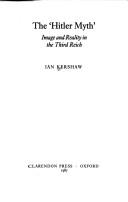Check nearby libraries
Buy this book

Kershaw examines how the deification of 'the Fuhrer' and the Nazi's propaganda machine effectively solidified the Third Reich's hold on German culture from the 1920's to 1945.
"Hitler's personality alone can scarcely explain his immense popularity and political effectiveness during the 1930s and '40s. Behind his strong hold over the German people lay the hopes and perceptions of the millions who adored him and consequently imbued him with larger-than-life characteristics. Based on secret popular opinion reports compiled by both the Nazis and their political enemies, this study of the Nazi state charts the creation, growth, and decline of the "Hitler Myth." Kershaw demonstrates how the manufactured Fuhrer-cult formed a crucial integrating force in the Third Reich and acted as a vital catalyst in attaining Nazi political aims. Translated from German, this book affords readers a chilling look at how these masters of propaganda built on the beliefs, phobias, and predjudices of the day to create a popular image of Hitler that was at great odds with reality."--Publisher description.
Check nearby libraries
Buy this book

Previews available in: English
| Edition | Availability |
|---|---|
|
1
The "Hitler Myth": Image and Reality in the Third Reich
October 22, 2001, Oxford University Press, USA, Oxford University Press
Paperback
in English
0192802062 9780192802064
|
cccc
|
|
2
The "Hitler Myth": Image and Reality in the Third Reich (Oxford Paperbacks)
June 1, 1989, Oxford University Press, USA
Paperback
in English
0192822349 9780192822345
|
zzzz
|
|
3
The "Hitler myth": image and reality in the Third Reich
1987, Clarendon Press, Oxford University Press
in English
0198219644 9780198219644
|
aaaa
|
|
4
The "Hitler myth": image and reality in the Third Reich
1987, Oxford University Press
in English
0192822349 9780192822345
|
cccc
|
Book Details
Edition Notes
Bibliography: p. [274]-276.
Translation of: Der Hitler-Mythos.
Includes index.
Classifications
The Physical Object
ID Numbers
Source records
Scriblio MARC recordIthaca College Library MARC record
Internet Archive item record
Better World Books record
Library of Congress MARC record
amazon.com record
marc_nuls MARC record
harvard_bibliographic_metadata record
marc_columbia MARC record
First Sentence
"'HEROIC' leadership was a significant element in the ideas of the nationalist and volkisch Right long before Hitler's spectacular rise to prominence."
Work Description
Few, if any, twentieth-century political leaders have enjoyed greater popularity among their own people than Hitler in the 1930s and 1940s. Yet the personality of Hitler himself and his obsessive ideological fixations can scarcely explain his immense popularity and political effectiveness on his assumption of power in 1933. Hitler's hold over the German people lay rather in the hopes and perceptions of the millions who adored him: their admiration rested less on the bizarre and arcane precepts of Nazi ideology than on social and political values recognizable in many societies other than the Third Reich. Ian Kershaw charts the creation, growth, and decline of the "Hitler myth". He demonstrates how the manufactured Führer cult formed a crucial integrating force in the Third Reich and a vital element in the attainment of Nazi political aims. Masters of the new techniques of propaganda, the Nazis used them to exploit and build on the beliefs, phobias, and prejudices of the day. Their successful "deification" of the Führer in a modern industrial state carries a far from comfortable message. - Back cover.
Community Reviews (0)
Feedback?| July 21, 2024 | Edited by MARC Bot | import existing book |
| December 19, 2023 | Edited by ImportBot | import existing book |
| August 18, 2020 | Edited by ImportBot | import existing book |
| July 31, 2020 | Edited by ImportBot | import existing book |
| December 9, 2009 | Created by WorkBot | add works page |

















